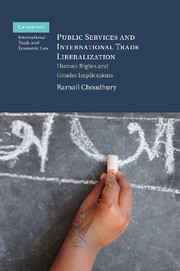Description
Public Services and International Trade Liberalization
Human Rights and Gender Implications
Cambridge International Trade and Economic Law Series
Author: Choudhury Barnali
This books examines whether public service liberalization poses a threat to gender and human rights?
Language: English
Subject for Public Services and International Trade Liberalization:
Approximative price 41.94 €
In Print (Delivery period: 14 days).
Add to cart
Public Services and International Trade Liberalization
Publication date: 11-2014
Support: Print on demand
Publication date: 11-2014
Support: Print on demand
Approximative price 82.21 €
In Print (Delivery period: 14 days).
Add to cart
Public Services and International Trade Liberalization
Publication date: 11-2012
376 p. · 15.5x23.5 cm · Hardback
Publication date: 11-2012
376 p. · 15.5x23.5 cm · Hardback
Description
/li>Contents
/li>Biography
/li>
Does public service liberalization pose a threat to gender and human rights? Traditionally considered essential services provided by a state to its citizens, public services are often viewed as public goods which embody social values. Subjecting them to market ideology thus raises concerns that the intrinsic social nature of these services will be negated. Moreover, as those most likely to be reliant on public services, public service liberalization may also further marginalize women. Nevertheless, states continue to increasingly liberalize public services. Barnali Choudhury explores the implications of public service liberalization. Using primarily a legal approach, but drawing from case studies, empirical research and gender theories, she examines whether liberalization under the General Agreement on Trade in Services and other liberalization vehicles such as preferential trade and investment agreements compromise human rights and gender objectives.
Introduction; Part I. Foundations: 1. International economic law and human rights; 2. Public services; 3. Instruments for liberalizing public services; Part II. Human Rights and Gendered Implications of Liberalization of Public Services: 4. Liberalization of water services; 5. Liberalization of educational services; 6. Liberalization of health services; 7. Accounting for the differential implications of liberalized public services on developing countries and women; Part III. The Future of Liberalization of Public Services: 8. Should public services continue to be liberalized?; 9. Conclusion; Index.
Barnali Choudhury teaches at Queen Mary, University of London. She previously practised corporate law and international investment arbitration.
© 2024 LAVOISIER S.A.S.




